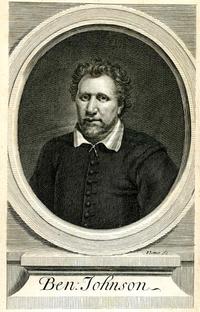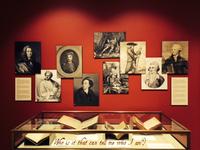bardolatry n. idolatry or excessive admiration of William Shakespeare1
There is an exhibition going on in the Rare Book Department right now that you really need to see. It’s called “Shakespeare for All Time” and it contains some of the rarest treasures in the Free Library’s collection.
“He was not for an age but for all time.” This tribute by Ben Jonson, a friend, critic and rival to Shakespeare, is prophetic in a way that would probably flabbergast jonson, the 17th century poet and dramatist who had aspirations for his own immortality. Shakespeare’s words―written over 400 years ago―have become part of our daily lives and infiltrated the way we think. Sea change; bag and baggage; woe is me; into the breach; one fell swoop; pound of flesh. These phrases that we use day in and day out: household words, if you will―oops! That’s another one―originated with Shakespeare. This exhibition investigates the circumstances that allowed Shakespeare’s words and ideas to endure.
Shakespeare’s plays were enjoyed by his contemporaries but so were Ben Jonson’s. Anyone seen a revival of Every Man in His Humour lately? Will Baz Luhrmann be updating Volpone? Shakespeare employed the English language like no other, and his intelligent observations about human nature transcend time and place. His plays embodied at once the high culture and bawdiness of the Elizabethan age yet they reached back to classical themes and stories. They also speak to what it is to be human—which is why his comedies, histories, and tragedies continue to be read and performed all over the world and in almost every language.
The survival of Shakespeare’s plays depended on their being accessible to the masses and, as David Scott Kastan puts it, “pliant in the hands of his lovers2.” Those lovers included his earliest editors; those who revived his plays during the eighteenth century; Charles and Mary Lamb, who transformed the plays from stage to bedtime story; and Arthur Rackham to whom Shakespeare’s “visionary” comedies, A Midsummer Night’s Dream and The Tempest spoke so vividly.
In the exhibition you will see books from these folks as well as paintings of authors influenced by Shakespeare and prints of 19th century actors playing the immortal roles. You will also have the opportunity to see the First Folio, one of the rarest books in existence, along with the Second, Third and Fourth Folios, attesting to Shakespeare’s great popularity shortly after his own time.
Shakespeare did not seek greatness for himself; his immortality was made possible by the men who worked with him and by the people who saw and read his plays. The plays survived because they are rich and multilayered in their humanity. They endure because they were and continue to be transformed. The exhibition currently on display in the William B. Dietrich Gallery presents material evidence of that transformation. The Rare Book Department is open Monday through Saturday from 9 am to 5 pm.
1. The Free Dictionary http://www.thefreedictionary.com/bardolatry. Accessed 3/23/14.
2. David Scott Kastan. Shakespeare and the Book. Cambridge: University Press, 2001.
Have a question for Free Library staff? Please submit it to our Ask a Librarian page and receive a response within two business days.



